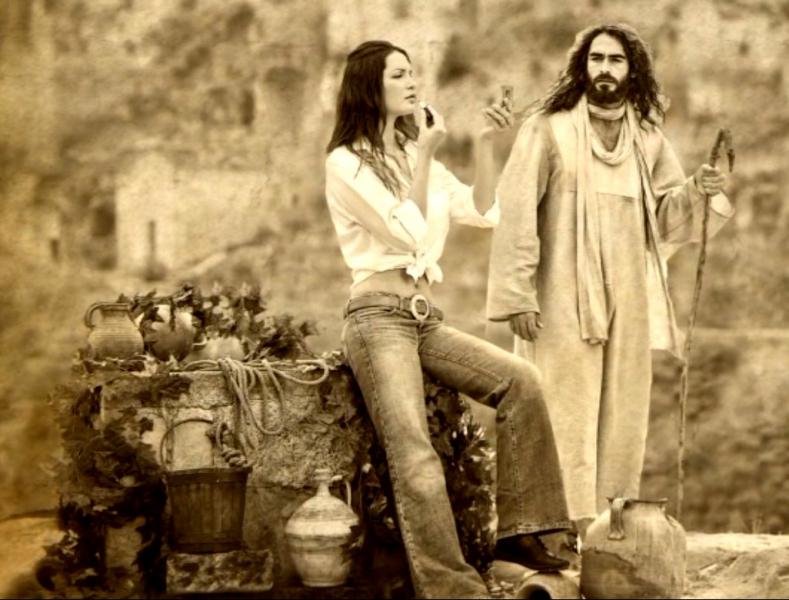
Fresh perspectives on Biblical Women–The Woman at the Well
Who do you immediately picture when you think of the woman at the well in John 4? Do you see a sleazy woman with overdone makeup, bangles and spangles, one of those morally loose floozies with a weakness for the wrong kind of men? When you meet her in heaven, how will you feel if she's actually a woman of integrity, courage, insight, and served Jesus as an evangelist? Of course, she was a sinner just like all of us. But we must be careful not to disparage anyone's character before we know the facts. What does John 4, as well as first century social customs, reveal about her character?
Normally we begin by digging into her conversation with Jesus at the well. Then we interpret the rest of the account through that lens. But this time, instead, let's begin at a different place and filter their earlier conversation through that lens.
Their final interchange at the well went like this:
Samaritan Woman : "I know that Messiah (called Christ) is coming. When he comes, he will explain everything to us."
Jesus: "I, the one speaking to you–I am he."
With this statement, she reveals her faith in a future Messiah and her fervent hope that even she, a Samaritan woman, will be included in His flock and blessings. She awaits His arrival with pleasure and anticipation. Jesus reveals that He is that long awaited Messiah, as if to communicate, "Yes, I'm here now. And although my disciples and other Jews don't see you, a Samaritan woman, as worthy, I've traveled out of my way to find you and those like you." Is Jesus speaking to her as a Jezebel or a woman of great faith?
About that time the disciples return from their shopping trip in town, shocked to find Him talking with not just a Samaritan but a woman! Jews despised Samaritans. They , considered them racially impure, half-breeds, and unworthy of fellowship and God's favor. Sounds like Jesus has broken protocol again. But He doesn't care and neither does she. Instead of engaging them, she scurries back to town, leaving her water jar, probably the only one she has, an indication that she's overwhelmed and exuberant about the encounter.
As she meets her friends in town, she doesn't hesitate the way many of us do when we have the opportunity to tell someone about Jesus. For many of us, fear of evangelism ranks up there with public speaking, hospitals, and even death. But she boldly declares, "Come, see a man who told me everything I ever did. Could this be the Messiah?" Verse 30 tells us that the other Samaritans "came out of the town and made their way toward him."
We need to stop and consider three points here.
1) The other Samaritans believe her witness immediately. They don't doubt the validity of her testimony, even in a culture that did not trust women enough to allow them to testify in a trial. If she had been the town "bad girl" would they have even listened, much less dropped what they were doing and set out to find Jesus? John even makes a point of telling us in 4:39 that "Many of the Samaritans from that town believed in him because of the woman's testimony, "He told me everything I ever did." Like an evangelist, she was first to herald the gospel to her town. "Our Messiah is here! Come and see."
2) She believes Him based on His divine ability to see beyond time. In their conversation at the well, He revealed her past. We see the same phenomena when Jesus called Nathanael to follow him by saying that He had seen him earlier in the day "under a fig tree" in John 1:43-49. Nathanael interpreted this prophetic messianic ability just like the woman at the well. They were in the presence of divinity and they knew it.
3) Jesus never labels her "a degenerate woman." He does not rebuke her or advise her, like the woman caught in adultery, "Go and sin no more," nor does he shame her for her numerous male companions. Why not we may wonder?
Also, we find clues to her character in Jesus' conversation with his disciples after she leaves. He uses this situation to give his disciples an evangelism lesson. He begins:
Don’t you say, ‘There are four more months and then comes the harvest?' I tell you, look up and see that the fields are already white for harvest! (4:35)
Did Jesus point to nearby fields? What did he mean by asking this question? I suggest that the disciples believed that Jesus was only for them–only for the Jews. No harvest existed here in Samaria! But Jesus had intentionally taken them through Samaria and He intentionally engaged a Samaritan woman in conversation. He knew her heart and He sought her out. The disciples were probably thinking, "Doesn't He know He is wasting time on these infidels?" But the Samaritans were the "ripe fields" the disciples couldn't see. The Samaritans and the woman at the well were looking for their Savior too, a foretaste of Jesus' invitation and inclusion of the Gentiles.
Jesus continues His metaphor about reaping and sowing, still talking about people the disciples felt were unworthy and not ready for harvest, these Gentile Samaritans and especially this woman.
The one who reaps deserves pay and gathers fruit for eternal life so that the one who sows and the one who reaps can rejoice together. For in this instance the saying is true, 'One sows and another reaps.’ I sent you to reap what you did not work for; others have labored, and you have entered into their labor. (4:35-38, NET)
He refers to "the one who reaps" and is gathering rewards in the hereafter. Who is that? Could He be referring to the woman at the well? Possibly. And if so, He seems to insinuate that the disciples should rejoice with her because many are coming to faith in Him through her testimony. They should work together–Jews and Gentiles, men and women–to bring in God's harvest. The woman at the well serves as a model for Christian women today of an early evangelist that Jesus praises. For centuries we've missed the point of the account because we've been so preoccupied with her morality, her "sexual promiscuity." I wonder if the powerful subject of sex sometimes derails us from looking deeper?
Was she sexually promiscuous as she is so often portrayed? Does it matter for women looking for biblical models to emulate?
Let's go back to their initial conversation. Jesus does show her his divinity by revealing that she's been a wife to five different men and she lives with a man who isn't her husband now. But could there be other explanations for her marital past?
Here are a few possibilities based on research by Dr. Lynn Cohick, associate professor of New Testament at Wheaton College, and author of "Women in the World of the Earliest Christians, Illuminating Ancient Ways of Life". She asks:
Could she have been widowed? In the first century, almost all woman were married. Families arranged these marriages for their daughters, often at thirteen or fourteen, and usually to older men. Life expectancy was drastically shorter and widowhood was common, as was remarriage, especially if no son or male relative was available to care for them. She could easily have been widowed more than once.
Could she have been barren and thus divorced? A woman's main value depended on her ability to produce a male heir to care for the family and carry on the name. If she was barren, more than one discontent husband might have divorced her. Jewish law in general reserved the right of divorce to the husband. Some commentators have suggested that she must have filed for divorce five times, but among the handful of Greek and Aramaic Jewish divorce documents available, only one seems to be initiated by a wife, and she needed a male representative to help her. It's far more likely that several husbands may have divorced her, leaving her abandoned in a harsh culture for women without financial means and male protection.
Could she have been in a forced relationship as a concubine? In the Greco-Roman world, women concubines were common, preferable to a life on the streets. She might have currently been in a relationship with a Roman citizen who could not legally marry her because she was below him in social rank. She might have been waiting on a dowry.
Could she have been someone's second wife? Although rare, historical evidence shows that polygamous relationships did exist in the first century. It's possible that her new companion was already married to someone else.
Examining first century legal records and contracts make for varying possibilities and situations foreign to us today. As we look back into the customs of the day, we can devise a number of reasonable scenarios that explain why she had five husbands and her current companion was not legally her husband. Was she a "bad girl"? We don't know, but we have evidence in the full text that she might not have been.
For centuries accounts of biblical women have lacked the same rigorous scholarship we usually afford accounts of biblical men. As a result, these women often come off as shallow, scant, one dimensional, and this neglect quickly places women in the temptress, bad girl category, without digging into the cultural societal situations which may explain why some of them don't belong there.
The woman at the well is just one example of how we've possibly mischaracterized some women in the Bible. Why was the account included in the Scriptures? Women need role models to encourage them to become all-in Christ followers just like men. Would the family, the church, and our communities look different if more women followed in the footsteps of the woman at the well?
Wouldn't it be tragic if all these years, God meant for this true story to encourage women to be bold for Him, but God's real message has been buried beneath an unintentional focus on her sexuality instead of going deep into the passage to glean the whole story. Selah.
Next month–Deborah




One Comment
Jaylam
Christ’s treatment of women
Very well put. Much in the face of culture and convention, Jesus, as revealed in the Bible, always treated women with dignity, respect and equal with men in worthiness of His time, message and mission.